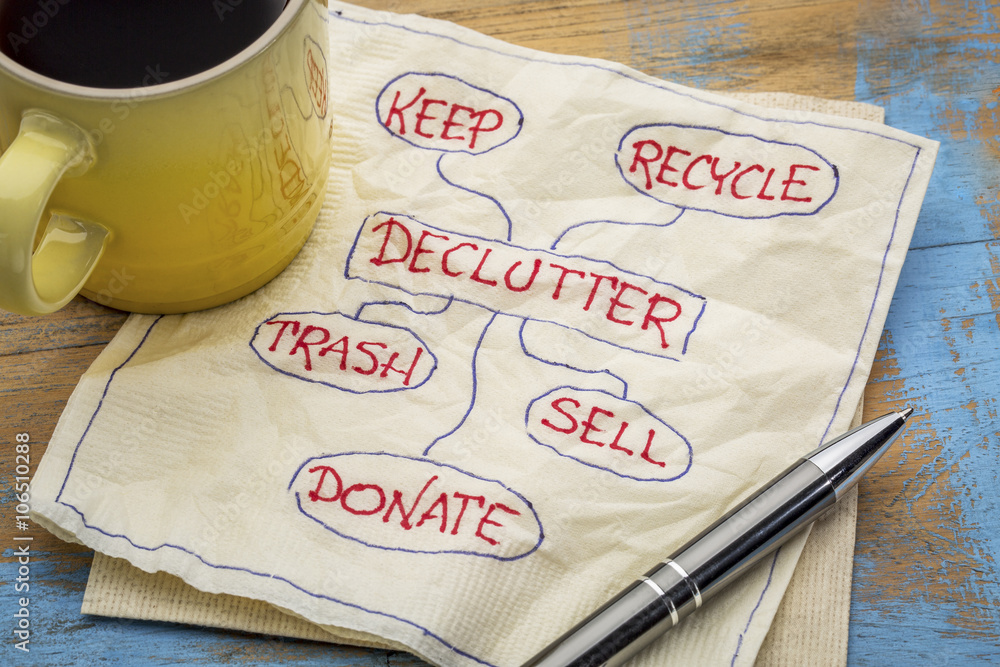Muddle is on the rise, with one in 4 Australians revealing their houses have extra messy than 5 years in the past; a rising downside that has an impact on their psychological well being to their hip pockets.
In response to new analysis commissioned by Choosi, in partnership with shopper analysis group MyMavins, over half of Australian households report experiencing litter or disorganization a minimum of as soon as a month. Basic odds and ends (46%), garments and footwear (34%) and paper, together with magazines, specials and receipts (28%) have been listed as the highest three issues cluttering houses.
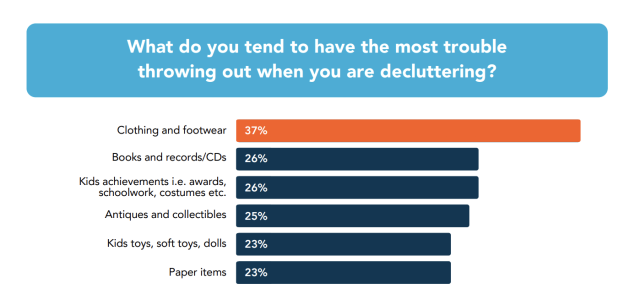

The Choosi Muddle 2.0 report surveyed over 1,200 Australians aged 18+, shedding mild on their habits and attitudes in the direction of family and digital litter, whereas revealing the limitations that cease them from kicking it to the curb. The analysis additionally delves into the influence litter can have on psychological well-being, whereas revealing the myriad advantages derived from de-cluttering.
Muddle is a actuality, with one in two households reporting experiencing litter or disorganization a minimum of as soon as a month, probably because of a rise prior to now few years.
The survey additionally discovered that round three in 5 (62%) discover it difficult to seek out time to declutter and clear. Amongst those that discover it difficult, essentially the most generally cited causes are lack of motivation (46%), restricted free time (40%) and lack of space for storing (39%).
Youthful Australians are extra affected than others, with Gen Z (39 per cent) and Gen Y (35 per cent) experiencing litter a minimum of as soon as per week in comparison with child boomers (17 per cent). The divide can also be felt amongst women and men, with half of males reporting they do not thoughts litter (50%) in comparison with lower than two in 5 girls (38%). To assist declutter, respondents suggest donating or promoting unused objects (51%), beginning small (45%), and avoiding impulse buys (43%).
Skilled organizer and proprietor of The Blissful Organiser, Edel Beatty, feedback: “Impulse purchasing is among the causes we accumulate an excessive amount of stuff and many people do not know we’re doing it. Though consumerism and promoting play a task on this conduct, we are able to construct our personal consciousness to assist us make higher selections.
“Because the analysis exhibits, many Australians really feel that litter and disorganization construct up in the course of the month. Many discover it troublesome to find time for decluttering and cleansing because of busy schedules. Making time for each de-cluttering and cleansing is vital, so scheduling time in your calendar helps. Common resets and brief 20-minute energy changes can actually assist maintain the mess at bay.”
On the subject of the price of protecting houses clear and tidy, virtually one in two (49%) cite the rising value of residing because the main stress on their skill to maintain a clear house. This led to cuts in cleansing provides (21%) and residential group programs (17%) to assist ease a number of the monetary stress.
As Australians really feel in a bind, they’re more and more turning to second-hand markets to show litter into money (45% in 2017; 6% in 2024). For these seeking to offload the surplus chaos, Meta’s Fb is the highest on-line market (67%), adopted by Gumtree (43%) and eBay (38%). Nevertheless, this doesn’t come with out threat, with over one in 4 (28%) reporting experiencing a rip-off on-line, highlighting the have to be vigilant when navigating on-line marketplaces.
The monetary influence of litter may also result in elevated spending, with virtually three in 5 (57%) admitting that family litter causes them to make pointless purchases. Garments and equipment (37%) have been listed as essentially the most frequent extra purchases. The considered decluttering has even deterred two in 5 (43%) from shifting or promoting houses, highlighting the surprising methods litter impacts Australians’ lives.
Provides Edel: “Shifting house could be overwhelming, but it surely will also be seen as a possibility to lastly filter loads of litter. Even when you have no upcoming plans to promote or transfer, begin decluttering now and give attention to one room or small space – a sluggish and regular strategy feels lots much less overwhelming.”
In response to the information, the influence of litter on psychological well being can also be growing. Extra Australians say it impacts their lives, rising from 47% in 2017 to 71% in 2023. Virtually three in 5 (57%) admit litter causes them stress or nervousness.
Not surprisingly, a clear house is related to psychological readability (80%) and well being advantages (78%) for 4 in 5 individuals. After decluttering, the report discovered that round three in 4 (74%) skilled enhancements in temper, with over 9 in ten (94%) experiencing constructive feelings similar to satisfaction (48%) and reduction (43%).
Emotional attachment could be one of many greatest challenges to beat when attempting to half with an merchandise, with almost two in 5 individuals (39%) reporting nostalgia as a key barrier to coping with litter. Along with this, round one in three (33%) Australians imagine the opposite greatest limitations to littering are the perceived usefulness of an merchandise (33%), monetary worth (32%) and issue making selections (31) .
Regardless of their love of journey, the survey additionally discovered that half of Australians spend extra time decluttering their houses than on vacation every year, logging 3.6 hours per week to declutter (187 hours every year). This time is extra usually wasted on weekends, with two in three (65%) discovering Saturday (34%) or Sunday (31%) essentially the most handy time to clear.
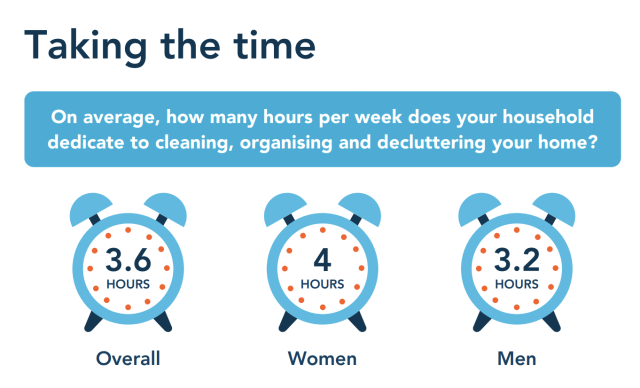

“At first of any giant cleanup job, it could actually take longer to see the influence and construct momentum. In the long run, although, the purpose is to have much less litter in our houses, which implies we’ll find yourself spending much less time cleansing and tidying up,” commented Edel.
Extra key findings
1. The principle motivations for decluttering are avoiding losing cash (88%), wanting a simplified way of life (87%) and concern of working out of area (84%).
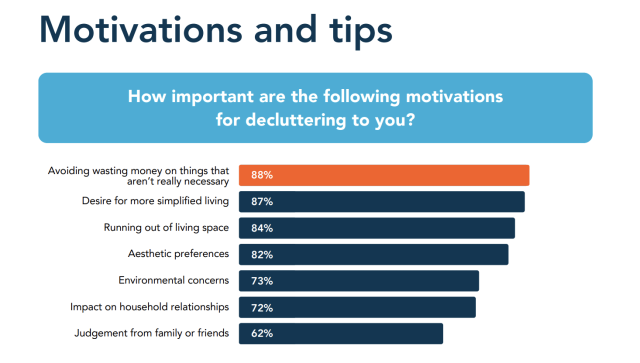

2. Over one in three (37%) cite inadequate storage as the principle explanation for litter, with hoarding outstripping scrapping (31%) and lack of time to declutter (31%) additionally contributing considerably.
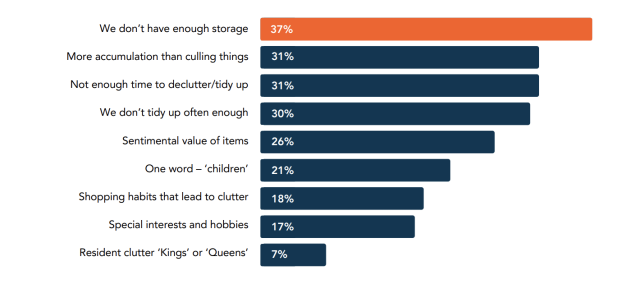

3. The storage or shed is the most probably place to be cluttered (19%), adopted by spare rooms (15%) and customary areas (13%).
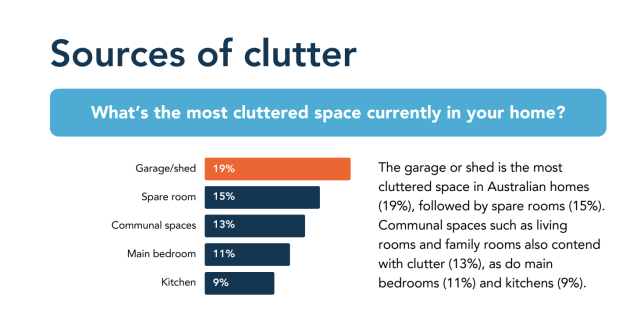

To keep away from digital litter, Australians cited deleting unused apps and software program (41%), often eradicating pointless information (39%) and unsubscribing from pointless e-mail newsletters (38%) as the most effective methods to handle. As well as, one in three (34%) keep away from pointless downloads, and an analogous proportion (33%) often assessment and delete previous images. The best satisfaction from clearing our digital litter comes from having no unread emails (43%), having an empty recycle bin (36%) and having no pointless apps (33%).
Extra insights from the research could be discovered at the Choosi web site.

